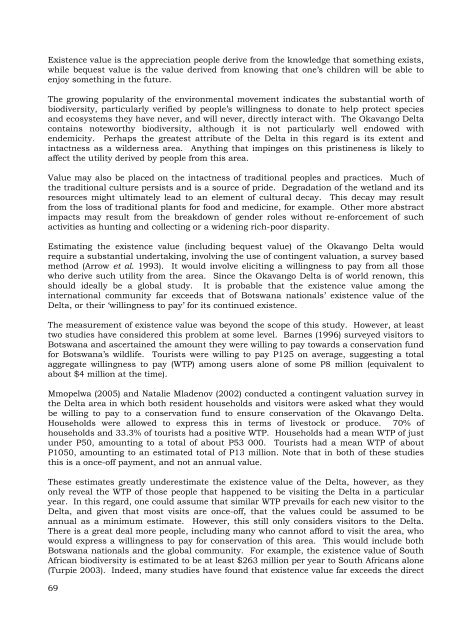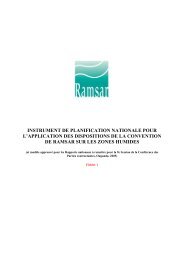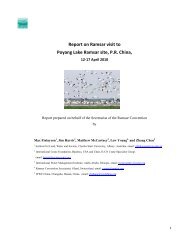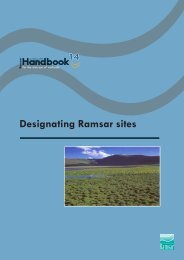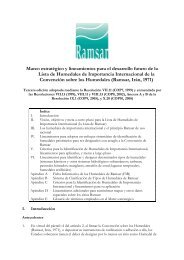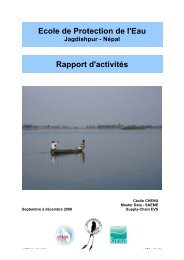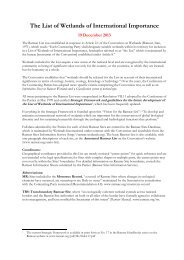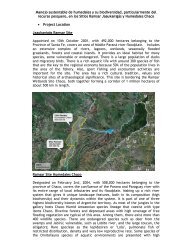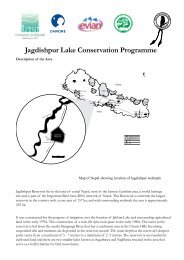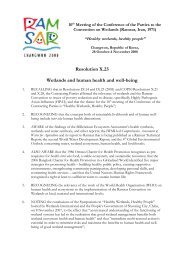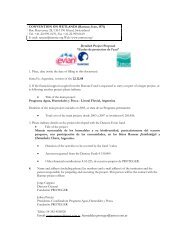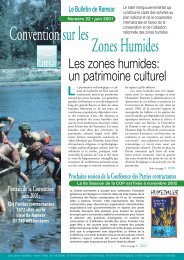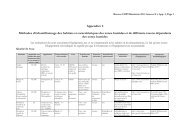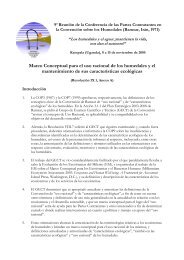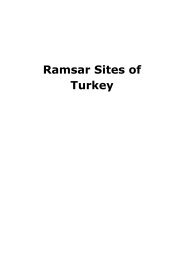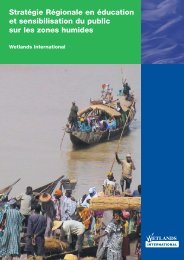Okavango Delta Management Plan - Ramsar Convention on Wetlands
Okavango Delta Management Plan - Ramsar Convention on Wetlands
Okavango Delta Management Plan - Ramsar Convention on Wetlands
Create successful ePaper yourself
Turn your PDF publications into a flip-book with our unique Google optimized e-Paper software.
Existence value is the appreciati<strong>on</strong> people derive from the knowledge that something exists,<br />
while bequest value is the value derived from knowing that <strong>on</strong>e’s children will be able to<br />
enjoy something in the future.<br />
The growing popularity of the envir<strong>on</strong>mental movement indicates the substantial worth of<br />
biodiversity, particularly verified by people’s willingness to d<strong>on</strong>ate to help protect species<br />
and ecosystems they have never, and will never, directly interact with. The <str<strong>on</strong>g>Okavango</str<strong>on</strong>g> <str<strong>on</strong>g>Delta</str<strong>on</strong>g><br />
c<strong>on</strong>tains noteworthy biodiversity, although it is not particularly well endowed with<br />
endemicity. Perhaps the greatest attribute of the <str<strong>on</strong>g>Delta</str<strong>on</strong>g> in this regard is its extent and<br />
intactness as a wilderness area. Anything that impinges <strong>on</strong> this pristineness is likely to<br />
affect the utility derived by people from this area.<br />
Value may also be placed <strong>on</strong> the intactness of traditi<strong>on</strong>al peoples and practices. Much of<br />
the traditi<strong>on</strong>al culture persists and is a source of pride. Degradati<strong>on</strong> of the wetland and its<br />
resources might ultimately lead to an element of cultural decay. This decay may result<br />
from the loss of traditi<strong>on</strong>al plants for food and medicine, for example. Other more abstract<br />
impacts may result from the breakdown of gender roles without re-enforcement of such<br />
activities as hunting and collecting or a widening rich-poor disparity.<br />
Estimating the existence value (including bequest value) of the <str<strong>on</strong>g>Okavango</str<strong>on</strong>g> <str<strong>on</strong>g>Delta</str<strong>on</strong>g> would<br />
require a substantial undertaking, involving the use of c<strong>on</strong>tingent valuati<strong>on</strong>, a survey based<br />
method (Arrow et al. 1993). It would involve eliciting a willingness to pay from all those<br />
who derive such utility from the area. Since the <str<strong>on</strong>g>Okavango</str<strong>on</strong>g> <str<strong>on</strong>g>Delta</str<strong>on</strong>g> is of world renown, this<br />
should ideally be a global study. It is probable that the existence value am<strong>on</strong>g the<br />
internati<strong>on</strong>al community far exceeds that of Botswana nati<strong>on</strong>als’ existence value of the<br />
<str<strong>on</strong>g>Delta</str<strong>on</strong>g>, or their ‘willingness to pay’ for its c<strong>on</strong>tinued existence.<br />
The measurement of existence value was bey<strong>on</strong>d the scope of this study. However, at least<br />
two studies have c<strong>on</strong>sidered this problem at some level. Barnes (1996) surveyed visitors to<br />
Botswana and ascertained the amount they were willing to pay towards a c<strong>on</strong>servati<strong>on</strong> fund<br />
for Botswana’s wildlife. Tourists were willing to pay P125 <strong>on</strong> average, suggesting a total<br />
aggregate willingness to pay (WTP) am<strong>on</strong>g users al<strong>on</strong>e of some P8 milli<strong>on</strong> (equivalent to<br />
about $4 milli<strong>on</strong> at the time).<br />
Mmopelwa (2005) and Natalie Mladenov (2002) c<strong>on</strong>ducted a c<strong>on</strong>tingent valuati<strong>on</strong> survey in<br />
the <str<strong>on</strong>g>Delta</str<strong>on</strong>g> area in which both resident households and visitors were asked what they would<br />
be willing to pay to a c<strong>on</strong>servati<strong>on</strong> fund to ensure c<strong>on</strong>servati<strong>on</strong> of the <str<strong>on</strong>g>Okavango</str<strong>on</strong>g> <str<strong>on</strong>g>Delta</str<strong>on</strong>g>.<br />
Households were allowed to express this in terms of livestock or produce. 70% of<br />
households and 33.3% of tourists had a positive WTP. Households had a mean WTP of just<br />
under P50, amounting to a total of about P53 000. Tourists had a mean WTP of about<br />
P1050, amounting to an estimated total of P13 milli<strong>on</strong>. Note that in both of these studies<br />
this is a <strong>on</strong>ce-off payment, and not an annual value.<br />
These estimates greatly underestimate the existence value of the <str<strong>on</strong>g>Delta</str<strong>on</strong>g>, however, as they<br />
<strong>on</strong>ly reveal the WTP of those people that happened to be visiting the <str<strong>on</strong>g>Delta</str<strong>on</strong>g> in a particular<br />
year. In this regard, <strong>on</strong>e could assume that similar WTP prevails for each new visitor to the<br />
<str<strong>on</strong>g>Delta</str<strong>on</strong>g>, and given that most visits are <strong>on</strong>ce-off, that the values could be assumed to be<br />
annual as a minimum estimate. However, this still <strong>on</strong>ly c<strong>on</strong>siders visitors to the <str<strong>on</strong>g>Delta</str<strong>on</strong>g>.<br />
There is a great deal more people, including many who cannot afford to visit the area, who<br />
would express a willingness to pay for c<strong>on</strong>servati<strong>on</strong> of this area. This would include both<br />
Botswana nati<strong>on</strong>als and the global community. For example, the existence value of South<br />
African biodiversity is estimated to be at least $263 milli<strong>on</strong> per year to South Africans al<strong>on</strong>e<br />
(Turpie 2003). Indeed, many studies have found that existence value far exceeds the direct<br />
69


